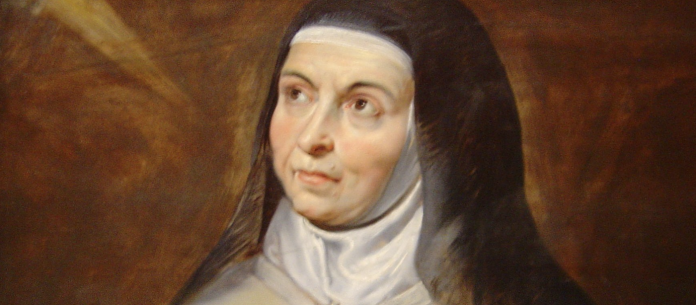
BARBARA YOFFIE
All of the saints had a great devotion to the Eucharist, and Teresa of Ávila was no exception. The Eucharist enables us to do God’s will and helps us grow in holiness. Teresa grew in holiness through prayer, meditation, and frequent reception of the Eucharist. She was sustained by the Real Presence of Jesus Christ in the Eucharist. She needed nothing more. Her deep devotion to God helped her do great things for the Church.
Teresa of Ávila’s life (1515-1582)
Feast Day is October 15
Also known as Teresa of Jesus
Patron saint of headache sufferers and Spanish Catholic writers
Teresa was a woman of piety, wit, and charm. At the age of twenty, she entered the Carmelite convent, where she battled both health problems and distractions in prayer. Meditating on the sufferings of Christ brought her into close union with God.
She felt God calling her to reform the Carmelite order. A strong-willed leader, she set out to restore the austerity and contemplative character of the first Carmelite convents. Teresa encountered opposition from many individuals, yet she traveled throughout Spain and successfully founded 17 convents.
Teresa wrote books about prayer and the spiritual life based on her personal experiences. Recognized as a mystic, reformer, and writer, she was proclaimed a Doctor of the Church in 1970.
Saint activities
■ Dedicate more time to contemplative prayer. Keep a journal of your prayers and reflections.
■ Reflect on Teresa’s words, “Whoever has God lacks nothing; God alone suffices.”
■ Older students and adults may wish to read Teresa’s books Interior Castle or The Way of Perfection. These are considered spiritual classics.
The sacrament of the Eucharist
The Eucharist is God’s great gift of Jesus to us. A Sacrament of Initiation, it is the very center of our lives. In the Eucharist the bread and wine become the Body and Blood of Jesus Christ through the power of the Holy Spirit and the words of the priest.
His promise to be with us always is fulfilled in the Eucharist. It recalls his great love for us, a love so great that he became human, suffered, and died for us.
The Eucharist changes us, and we become one with Jesus Christ and one another. Nourished by Jesus Christ in the Eucharist, we reach out to others in love and works of service.
Sacrament activities
■ Read about the lives of other saints who promoted devotion to the Eucharist: John Vianney, Catherine of Siena, and Thérèse of Lisieux.
■ The word eucharist means “thanksgiving.” In prayer, thank God for all your gifts and blessings.
■ Participate in different forms of Eucharistic devotion: visit a Catholic Church for quiet prayer before the tabernacle or attend Eucharistic Adoration and/or Benediction.
■ Volunteer for a ministry at Mass — act as a reader, server, usher, choir member, or bring forward the gifts.
■ Sit close to the altar so young children can observe what takes place during Mass.
■ Pray the Sorrowful Mysteries of the Rosary or the Stations of the Cross to meditate on Jesus’ suffering and death on our behalf.
■ Pray the fifth Luminous Mystery: the institution of the Eucharist.
BARBARA YOFFIE, MRE, is a director of religious education and saint enthusiast. She is the author of the Saints and Me! series from Liguori Publications.
PHOTO: PUBLIC DOMAIN
This article was originally published in Catechist, November-December 2019.




